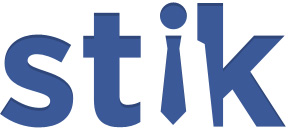The founders of Stik needed a change. Silicon Valley wasn’t working. Something was missing. And, as I learned during our chats, they needed access to a new pool of talent. They found all that in Detroit.
Stik launched two years ago from the Bay Area. As Leena wrote at their launch, Stik attempts to create a recommended list of service professionals online through a user’s social graph. Stik now lists 175k small businesses with 2.7 million recommendations and reviews. But as the founders discovered, Silicon Valley is not an easy place to grow a long-term business. After two years of trudging through the Valley, the four person company packed its bags this summer and headed back to the founders’ hometown of Detroit.
Stik launched with the goal of bringing word of mouth referrals online. Co-founder Nathan Labenz discovered while attending Harvard and running a business on the side that word of mouth referrals are very valuable. Together with Jay Gierak, a hometown friend from Detroit and Harvard classmate, the pair launched Stik in November 2010. A $500k seed investment from Tim Draper got the company up and running.
 The company grew to four employees and worked out of an office in San Francisco’s SOMA neighborhood. “The Bay Area has an incredible culture. It’s very progressive,” explained Nathan Labenz to me one bright November morning in downtown Detroit’s bustling M@dison Building. But he countered saying, “Here in Detroit, there is a lot more sense of commitment, determination, grit, and loyalty, which makes up for it.”
The company grew to four employees and worked out of an office in San Francisco’s SOMA neighborhood. “The Bay Area has an incredible culture. It’s very progressive,” explained Nathan Labenz to me one bright November morning in downtown Detroit’s bustling M@dison Building. But he countered saying, “Here in Detroit, there is a lot more sense of commitment, determination, grit, and loyalty, which makes up for it.”
Co-founder Jay Gierak added, “The conversations here [in Detroit] are shockingly similar. There is a larger volume of people in the Bay Area, so you get a bigger diversity of people working on things. There are 50 incubators, rather than just one. However, the quality of the conversation is not different.”
The pair is from the Detroit region. Jay attended University of Detroit Jesuit High School. Nathan went to Chippewa Valley High School in Clinton Township, located just outside of Detroit. The two met shortly before attending Harvard together.
“We initially started the business in San Francisco for the same reasons everyone starts a business in and around Silicon Valley – it was the thing to do,” Jay told me. “Ready access to experienced mentors and investors taught us quite a bit in our early days, as we had limited experience developing consumer web products from the outset.
“When we looked around Silicon Valley, we felt we couldn’t build a long-term company there because of the turnover – not only to get people in the door but retain them.” Jay explained, “It’s hard to compete with Facebook and Airbnb but also the YC’s of the world where there are people whispering in your ear to start a two-person app company.”
“We thought there was a culture in Detroit where we could build a long-term company that was going to win,” He added. “Thus far it’s been true and we’ve hired terrific people that are motivated, talented, and skilled.”
Stik hired four people since moving into Detroit’s Madison Building in September and expects to hire four more early next year.
“We have time to get to know potential hires here,” Nathan stated. “We can take a couple of meetings, work through a code problem together. By the time you do that in Silicon Valley, the person has already taken a job.”
Jay added somewhat jokingly, “They’ve already been hired and fired three times.”
“We just feel like we are able to proceed much more thoughtfully, carefully, making sure we have the right nucleus of people,” concluded Nathan.
It’s very evident that Jay and Nathan are proud of their decision to uproot the company and move home. It clearly wasn’t an easy decision, but now that they are here, working in the beautiful Madison Building, they seem right at home. Detroit was the only place they considered.
“We think Detroit is a better place to build a business than the Valley,” stated Jay, advising “Go find a place where you can differentiate your product and support network.”
But when asked if they would start a company in Detroit, both Jay and Nathan were indifferent, simply noting that it’s important to have good backers, good advisers and good team members.
“We had a great network the last two years in the Valley. But the employee side was more advantages here in Detroit being a much bigger fish in a smaller pond of startups. We didn’t start here 2 years ago because we didn’t see the network of investors and advisers that we knew existed in Silicon Valley. But that was 2010. Now, in 2012, there’s a lot of resources here between Quicken Loan’s major investment in the tech scene and an investor group in Ann Arbor that has been very helpful.”

Detroit has a growing tech scene with one dominant venture capitalist firm looming large: Detroit Venture Partners. Also operating out of the Madison Building, DVP aggressively recruits for the area. Josh Linkner sits atop DVP’s mounting portfolio as CEO and Managing Partner. Josh is a four-time entrepreneur, most notably the founder, chairman and former CEO of ePrize.
DVP is actively fundraising and thus will not disclose the size of their fund. Josh assures me that they are not constrained for capital, though. The firm employs seven full-time staffers plus three partners including Dan Gilbert, Brian Hermelin, and Josh Linkner himself. Linkner explains that DVP made 15 investments so far and will invest in 8-10 companies per year. One of these companys is Quikly which also recently moved to Detroit from Philadelphia.
Quikly, a startup that tackles daily deals by instilling a sense of urgency, was founded by Shawn Geller and Scott Meves on a seed investment by Detroit Venture Partners and Pennstro Ventures. But Shawn had never been to Detroit before pitching to DVP in November 2011. He heard from a friend of Josh Linkner and the exciting things happening in Detroit.
“It was a combination of the rebirth of the city, DVP’s quest to draw talent to the area, and the resources/networks they brought to the table that drew me in. In January 2012, I received a term sheet and made arrangements to move out on February 15th.” noting that he remembers the date vividly since he was leaving his longtime girlfriend the day after Valentine’s Day. Quikly grew to a five person team and recently ran successful deals with Michigan-based outfitters, Moosejaw and the Cleveland Cavaliers, helping to sell 180 tickets in the first 23 minutes.
 “I basically picked up my whole life and started working out of the Madison before the investment even closed,” he told me adding “I’m a prime example of what DVP is trying to create in the city. I think they’re not just about the capital but the resources on hand are just phenomenal.”
“I basically picked up my whole life and started working out of the Madison before the investment even closed,” he told me adding “I’m a prime example of what DVP is trying to create in the city. I think they’re not just about the capital but the resources on hand are just phenomenal.”
Josh Linkner echoes Shawn’s sentiment. “We bring far more than money… we bring deep experience, contacts, and mentorship to help our companies win.”
This is a common sales pitch but it’s unique in modern Detroit. The entire region houses many startups. Ann Arbor is right down the road from Detroit and has a vibrant startup and VC community. But Stik, Quikly, and dozens of other startups are moving to downtown Detroit mostly because of a major investment from Dan Gilbert and Quicken Loans.
Dan Gilbert moved his large mortgage from the suburbs to downtown Detroit in 2007 and has thus acquired a significant amount of real estate surrounding its main offices in the Compuware Building. The company purchased the Madison building in 2011 and put $12M into renovations. The building is now 100% occupied including a swanky coffee shop on the ground floor.
During a chat in November, Dan explained to John Biggs and I that he has a strong motivation to help Detroit. He grew up in Detroit, went to school here, but housed his company in the Detroit suburbs. He explained in detail that it’s his goal to make Detroit great again, but moreover, retain the sheer amount of talent pumped out by Michigan’s schools.
“I think it’s pretty clear to everybody they want to be in urban core, so they just ditch Michigan. When you sit around tables and you listen to people talk about their relatives or their kids or their grand kids or their friends or their friends’ kids, they say ‘This one is moving to Chicago, this one is moving to New York, this one is moving to San Francisco.'”
“I felt that we have to affect the urban core to maintain and acquire talent. Why not make it great in Detroit,” Gilbert questioned.
At the close of our chat, he pitched Detroit this way: “You can go anywhere else if you’re smart and you’re going to build a company. But if you want to really get in at the ground floor of something very special, you want to come to Detroit because you’re going to find things — it’s not only very exciting but less expensive. You’re going to find great, motivated people. Your people are the most important thing you have in these kinds of businesses.”
Stik bought it. These companies discovered capital is available and talent is ripe for the picking in Detroit. There are 30+ companies working out of the Madison including Ludlow Ventures, a Twitter sales office and Bizdom, a non-profit entrepreneurship accelerator also funded by Dan Gilbert and Quicken Loans.
Detroit is not trying to be the next Silicon Valley. The city, the startups, and the people are just trying to be Detroit, a city built on the back of teams of hardworking individuals. Detroit will never have everything found in the Valley.
When I asked the founders of Stik what they miss most of Silicon Valley, they both chuckled and responded nearly in unison: “The weather.”
